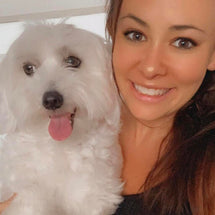Can Puppies Eat Adult Dog Food?

As a pet owner, you want the best for your dog, ensuring they grow healthy and strong. One common question is whether puppies can eat adult dog food. Understanding the differences in nutritional needs between puppies and adult dogs is crucial for your puppy's development.
Do Puppies Need Their Own Type of Food?
The truth is, puppies don’t need different food if they're provided with nutrient-rich meals made from real, wholesome ingredients.
Although puppies need additional protein and fat in their diet in comparison to adult dogs, adults still thrive on these higher inclusion rates, as well as the higher levels of amino acids, minerals and omega 3 fatty acids, which can contribute to a healthier dog long term!
In fact, choosing an "all lifestage” diet can actually be a better option for both your pup and adult dogs as they are usually more carefully curated in order to support the health and well being of all ages, puppies, adults and seniors alike!
Look for brands that don’t cut costs by reducing protein and fat content as they reach adulthood.
What Specific Nutrients Do Puppies Require That Differ From Adults?
Puppies have unique nutritional needs compared to adult dogs, primarily because they are in a critical growth phase that demands higher energy and specific nutrients.
1. Protein
Puppies need a higher percentage of protein in their diet to support the rapid growth of muscles, tissues, and organs. Protein is essential for building and repairing body tissues, and puppies require a minimum of 22-32% protein in their diet, compared to adult dogs who need around 18-25%!
2. Fat
Fat provides a concentrated source of energy, which is vital for the high energy needs of growing puppies. Additionally, fats are necessary for the absorption of fat-soluble vitamins and support healthy skin and coat. Puppies require approximately 8-20% fat in their diet, while adult dogs require less at a minimum, at around 5-15%.
3. Calcium and Phosphorus
These minerals are crucial for bone development. Puppies need higher levels of calcium and phosphorus to ensure proper bone growth and strength. An imbalance or deficiency can lead to skeletal problems. The recommended ratio of calcium to phosphorus in puppy food is generally between 1:1 and 1.8:1 (depending on their breed).
4. DHA (Docosahexaenoic Acid)
DHA is an omega-3 fatty acid essential for brain and eye development in puppies. It supports cognitive function and vision. While adult dogs can benefit from DHA, it is particularly critical during the puppy stage.
5. Minerals
Puppies need higher levels of certain minerals, such as iron, copper manganese and selenium to support their growth and aid in immune function, bone health, and overall development.
6. Calories
Puppies have higher caloric needs per pound of body weight than adult dogs due to their rapid growth and higher activity levels. They require more calories to fuel their developing bodies.
7. Amino Acids
Certain amino acids, like arginine and lysine, are required in higher amounts for puppies. These amino acids are crucial for growth and development, supporting various physiological functions.
What Happens If a Puppy Eats Adult Dog Food?
Because puppies have different nutritional requirements to adult dogs, if a puppy regularly consumes adult specific dog food, which is formulated for maintenance rather than growth, they might not get the essential nutrients they need. This can lead to issues such as:
- Stunted Growth: Without adequate protein and calories, a puppy’s growth may be hindered.
- Developmental Problems: Lack of essential nutrients like calcium and phosphorus can affect bone development.
- Energy Deficiency: Puppies have higher energy needs, and adult dog foods may not provide sufficient calories.
So the answer to that question - can puppies eat adult dog food? No. As a treat it will not harm them, however, to ensure they have enough nutrients for growth and development, you must feed your puppy either a puppy specific or an all lifestages food until they reach adulthood!
When Can a Puppy Eat Adult Food?
Transitioning your puppy to adult dog food is an important milestone. However, the timing depends on your puppy's breed and size. Generally, puppies can start transitioning to adult food when they reach about 80% of their expected adult size. This typically occurs:
- Small Breeds: Around 9-12 months of age (Chihuahuas, Dachshunds, Maltese, Cavoodles)
- Medium Breeds: Around 12 months of age (Kelpies, Cocker Spaniels, Australian Cattle Dogs, Border Collies)
- Large Breeds: Around 12-18 months of age (Labrador Retrievers, Golden Retrievers)
- Giant Breeds: Around 18-24 months of age (Bernese Mountain Dogs, Great Danes, Mastiffs)
Have a look at this blog to learn more about large breed puppy food.
How Long Should a Puppy Eat Puppy Food?
Puppy food is specifically designed to meet the high nutritional demands of growing dogs. It is recommended that puppies remain on puppy food until they reach their full adult size, which varies by breed. During this crucial growth period, it’s important to ensure that you provide food that supports their developmental needs.

Is Petzyo Suitable for Puppies?
Yes, Petzyo is ideal for puppies thanks to its high inclusion rates of essential nutrients and use of wholefood ingredients, locally sourced for freshness and quality. Tailored specifically to cater for growth and development, Petzyo provides the perfect balance of protein, fats, vitamins, and minerals puppies need to thrive.

Petzyo: Suitable for All Ages
At Petzyo, we understand the importance of providing high-quality dog food tailored to the needs of dogs of all life stages. Our products exceed the AAFCO (Association of American Feed Control Officials) minimum requirements for nutritional adequacy. This means that our formulations are designed to meet or surpass the standards set for both growth and maintenance, making our food suitable for puppies, adult dogs, and senior dogs alike.
By exceeding AAFCO’s nutritional guidelines, we ensure that our food supports healthy development in puppies while maintaining optimal health in adult and senior dogs. Our commitment to quality means that pet owners can confidently feed their dogs Petzyo throughout their entire life.






